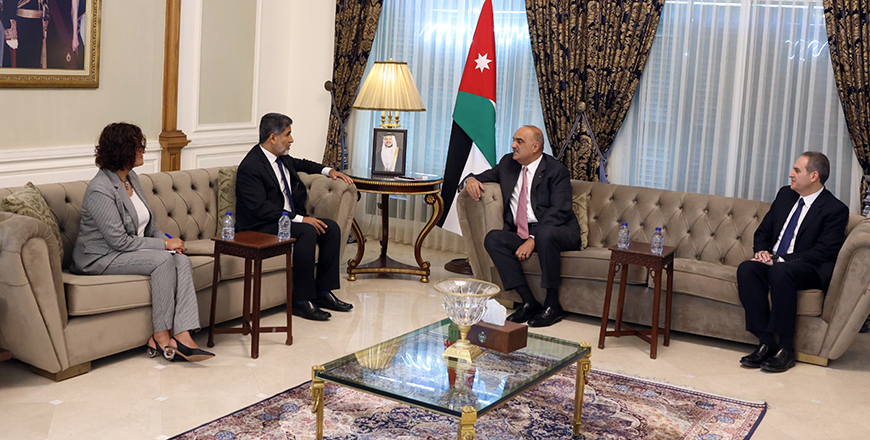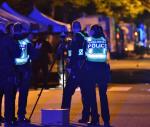You are here
WHO virtual meeting discusses COVID vaccination drive
By Bahaa Al Deen Al Nawas - Jan 28,2021 - Last updated at Jan 28,2021
AMMAN — The World Health Organisation (WHO) on Wednesday held a virtual press conference on COVID-19 vaccines in the Eastern Mediterranean region. Participants, including a representative from Jordan, discussed matters related to the vaccination process and its progress, in addition to other health-related issues.
“This month, the world is approaching a grim milestone of 100 million cases of COVID-19, including more than five million cases in our region, this is a stark reminder that comprehensive diseases control efforts must continue to be aggressively scaled up by governments and communities, with the support of WHO and partners,” the organisation’s Regional Director for the Eastern Mediterranean, Ahmed Al Mandhari, said in the opening remarks.
Mandhari said that at the national level, all countries in the region established and maintained effective multi-sectoral mechanisms to coordinate the response activities within government institutions and with other stakeholders while promoting strong partnerships with communities and the private sector.
He highlighted the efforts of countries in the region to improve their capacities in PCR testing, ICU and critical care, training and mentoring, and infection prevention and control practices through establishing strong policies and programmes at national and sub-national levels.
“This year, more than 235 million people will require humanitarian assistance worldwide, a massive increase of 40 per cent from last year, 43 per cent of these people live in this region,” Mandhari said.
He added that the world is also responding to nine large-scale humanitarian crises, and in these settings countless people continue to die needlessly and anonymously from preventable infectious diseases, untreated non-communicable diseases, violent trauma, obstetric complications, neonatal illnesses, malnutrition and others.
Discussing the developments of COVID-19 in Jordan, WHO representative in Jordan Cristina Maria Profili said that Jordan reported the first case of COVID-19 on March 7 last year, and during the first phase, Jordan reported five to 10 cases per day. Cases hiked in July and August after the lifting of the lockdown, noted Profili.
“By the end of September, Jordan declared community transmission with more than 400 cases a day, with a peak of almost 8,000 cases a day on the 18th of November. Currently around 1,000 cases are reported every day,” Profili said, noting that Jordan has had about 320,000 cases and 4,200 deaths.
Since the onset of the pandemic, the WHO country office in Jordan joined the national epidemic committee, supported by the Health Ministry, to work on preparing the COVID response plan, and coordinate with partners, donors and the local communities in providing technical guidance related to surveillance and contact tracing.
Profili said that Jordan was the seventh country in the region that introduced the COVID-19 vaccine, and the process started on January 13 of the current year. She added that the vaccination is free and voluntary for all people living in Jordan, irrespective of the nationality and citizenship.
“The process is done through an advanced electronic registration system… 300,000 people have registered so far on the platform, around 30,000 have received the vaccine,” she said, noting that one day after the vaccination started, on January 14, a total of 34 refugees were vaccinated in Zaatari camp, “making Jordan one of the first countries to leave no one behind and ensuring equitable access to the vaccine”.
Profili conveyed the WHO Country Office in Jordan’s thanks to the government as well as the partners and donors, for their efforts in protecting every individual residing in the Kingdom.
The press conference also hosted Regional Emergency Director Richard Bernan and Director of Communicable Diseases Yvan Hutin.
In an answer to a question about her own vaccination, Profili explained the registration process and how the data is integrated to facilitate the process. A week after registration, she received an SMS from the Ministry of Health indicating the time and place where the vaccination would take place.
“I received the vaccine in a very organised and very clean environment, no queue or anything, and the moment I left the hospital I received an SMS on the appointment for the second shot,” she said.
A week has passed since the first shot, Profili said, noting that she only felt a slight pain that lasted only for a couple of days.
Throughout the conference, the experts explained that even those who receive the vaccine ought to keep on wearing masks and following hygiene practices, because they are still prone to being infected albeit showing no symptoms, and still can be infectious and infect others through nasal and droplets.
Profili, answering a question regarding people’s reluctance to take the vaccine in Jordan, said that anti-vaccination is a global issue and Jordan is no exception, but overall, Jordanians have strongly supported the process.
The government is also counteracting misinformation and rumours about the vaccine through awareness campaigns, she said, noting that since the beginning of the pandemic, the prime minister and the minister of health have launched a nationwide campaign on COVID, supported by the WHO, UNICEF, the Royal Awareness Society, and the National Centre for Family Affairs among other national partners.
Regarding the matter of side effects, Hutin said, “The question that comes up always is whether the vaccine has side effects that would appear in the long term, the answer is no”.
Related Articles
AMMAN — Jordan has set an example in its response to the COVID-19 pandemic through strengthening the Kingdom’s health system, Director of th
AMMAN — The National Centre for Security and Crisis Management (NCSCM) on Sunday invited Jordanians and non-Jordanian residents, wishing to
AMMAN — Prime Minister Bisher Khasawneh on Thursday received Regional Director of the World Health Organization (WHO) for the Eastern Medite


















